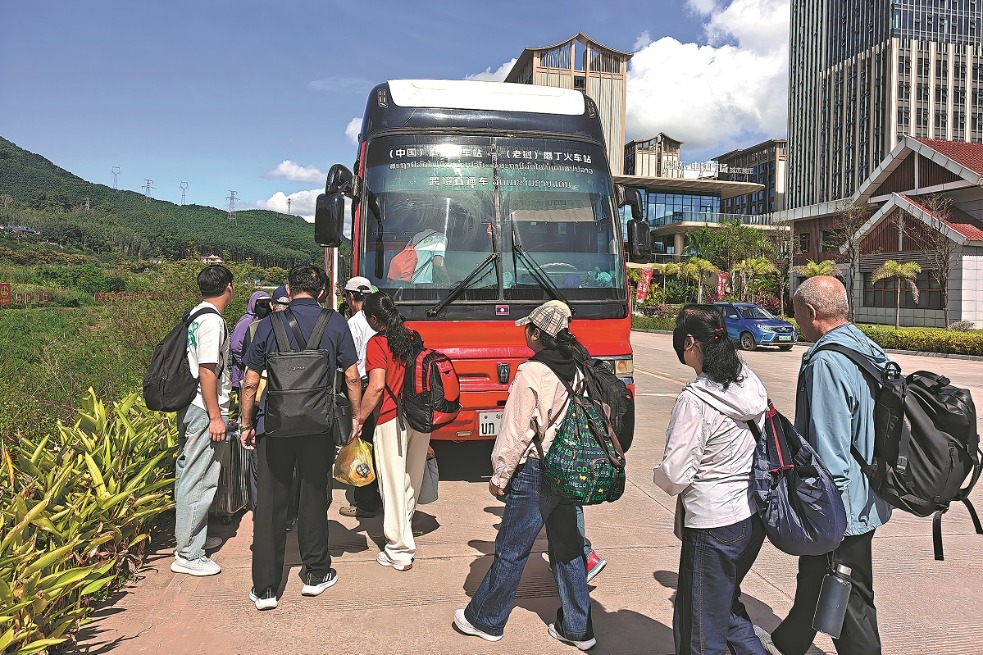What they say

Five officials shared their stories of poverty alleviation through the improvement of transportation infrastructure in China's rural and financially-strapped areas at a news conference held by the State Council Information Office on Wednesday.
Xu Wenqiang, director of the Tibet autonomous region's transportation department
I was dispatched by the Ministry of Transport in 2017 to support the local development of the Tibet autonomous region to make sure no one would be left behind in the country's building of a moderately prosperous society in all respects due to weak transportation conditions. During the past four years, I spent at least 10 months in Tibet every year and traveled more than 180,000 kilometers in rural areas. I visited hundreds of Tibetan families to understand the real situation of their poverty and figure out their needs and hopes. I was supposed to return to Beijing a year ago, but I happily embraced the ministry's decision to extend my tenure for three more years. For me, it's a recognition and also an award.
Luo Hongbo, an official with the department of policy and legislation under the Ministry of Transport and deputy Party secretary in Anyuan county, Jiangxi province, between March 2016 and March 2018
I worked in Anyuan county at the intersection of the provinces Jiangxi, Fujian and Guangdong, which is rich in natural and tourism resources. Many friends asked me if it's far away. Before 2013, my answer was a big yes, though it's less than 200 kilometers from Ganzhou city. A single trip to the downtown area would take over a day. With the launch of the special aid program in the county, however, dramatic changes have taken place in terms of its transportation infrastructure, and it has built a vast expressway network connected with neighboring provinces.
Gui Zhijing, an official with the safety and quality supervision and management department under the Ministry of Transport and deputy Party secretary of Sertar county in the Tibetan autonomous prefecture of Garze, Sichuan province
Sertar county, where I have been working since 2018, sits at the junction of Sichuan and Qinghai provinces, with an average elevation of over 4,100 meters. The oxygen content there is only 65 percent of that in Beijing. Due to its remote location, Sertar remained one of the country's slowpokes in the transportation sector. With the development of transportation infrastructure on the fast track over the years, yak breeding bases, plateau vegetable planting bases and handmade soap factories have sprung up, offering many jobs to local farmers to help them eradicate poverty. Because of the improved roads, people's lives are getting better and better.
Lyu Yida, an official with the China Rescue and Salvage Center of the Ministry of Transport and first Party secretary in Rela village, Aba Tibetan and Qiang autonomous prefecture, Sichuan province between September 2017 and September 2019
The Han and Tibetans have differences in living habits and customs, but the people of the two ethnic groups share the same prospects for a better life. I visited local villagers quite often, helping them with farm work, family chores and promoting agricultural products. When you treat them wholeheartedly, they will cooperate with your work with all their hearts. During my two-year stay in Rela, the villagers gained access to asphalt roads and bus service, which facilitated the development of e-commerce and agricultural industries. In 2018, young people returned to the village and set up a local specialty company, which achieved sales revenue of 2.6 million yuan and employed 30 residents last year.
Wang Guangguo, Party secretary of Dianziping village, Jianshi county, Enshi Tujia and Miao autonomous prefecture, Hubei province
Dianziping is isolated by mountains and rivers, and only a dangerous pathway, which claimed seven lives in the past decades, connected the little village to the outside world. If you want prosperity, first build a road. When elected as Party secretary, I talked everyone into building roads, from a footpath to a gravel road and from a cement road to the current asphalt road. The convenient transportation and beautiful scenery increased the popularity of the village and spurred a boom in other businesses including rural homestays and local specialty sales.
Wang Keju





Today's Top News
- Xi congratulates Catherine Connolly on assuming Irish presidency
- Inclusivity critical for AI governance
- Massive response to latest bonds issue
- Control of precursor chemical exports tightened
- Xi greets Ouattara on reelection as Cote d'Ivoire president
- CIIE displays innovation, global confidence in China






























